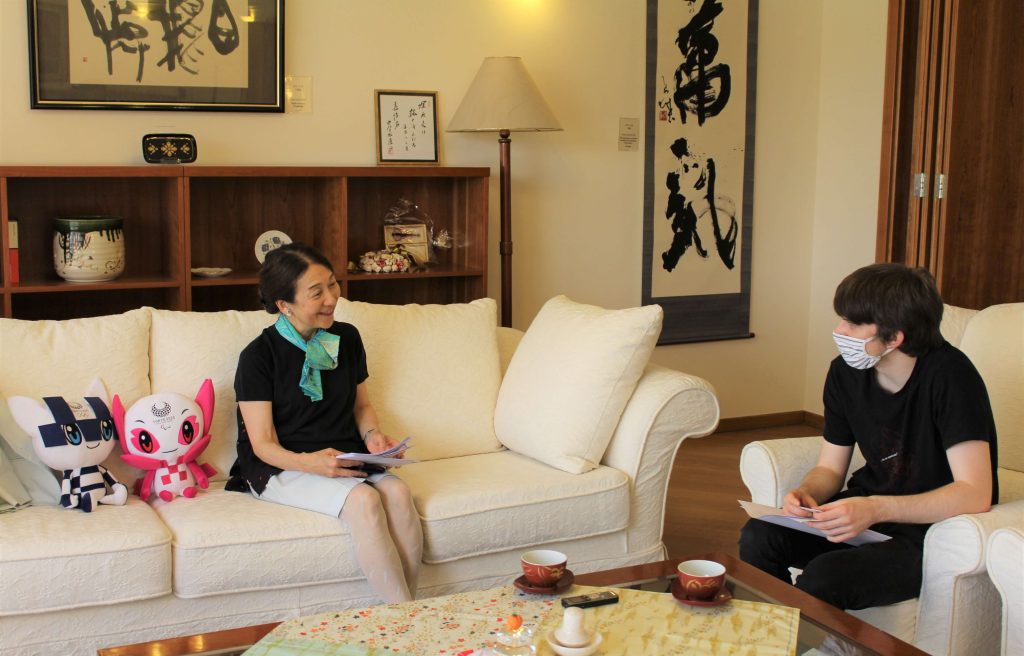Croatia and Japan officially established diplomatic relations on March the 5th, 1993.
I was nervous while the taxi drove me to the Ambassador’s residence. Japan is known for punctuality, and I worried whether or not I’d manage to make it on time as my cab was trying to break through Zagreb’s midday rush. But in the end, I managed to arrive ahead of schedule. It was great that I wasn’t late, but that’s still clearly a very far cry from the punctuality of a country where a train conductor apologised when the train left the station 25 seconds ahead of schedule.
As I was rewinding the questions I had prepared in my head, I thought about greeting my interlocutor-to-be. Handshakes are a bit of a risky thing due to the coronavirus pandemic, but even if that annoying virus was somehow erased from existence, in Japanese culture, people would still greet each other by bowing. Do I need to bow, or does the Ambassador need to follow the Croatian culture of handshaking (or perhaps bumping fists in these pandemic-dominated times)?
Cultural Attache, Yutaro Nishida welcomed me to the premises, and at last, introduced me to the Japanese Ambassador Misako Kaji, who welcomed me with a smile, respect, and kindness. The debate on whether to bow or fist-bump was resolved by doing both, with both sides respecting and accepting each-others cultural background. For safety, I kept my mask on while the Ambassador removed hers so that her voice could be more clear as the interview was recorded. I moved my mask only occasionally to drink the amazing traditional green tea that was served during the interview, which was paired well with a warm and friendly atmosphere from the official representative of Japan in Croatia.
Misako Kaji graduated with a BA in the economy at the University of Tokyo, followed by an MA in philosophy, politics, and economy at no less than Oxford University. Inside the Japanese Ministry of Foreign Affairs, she served in the Japanese Embassies in the UK and Vietnam, but also in Japanese EU and UN missions. As an Ambassador and deputy of the main representative, Kaji also served in Japan’s Delegation to international organisations in Geneva. In Japan, she was the deputy spokesperson for the Japanese Prime Minister and was a professor at the Tokyo and Hitotsubashi Universities. Ambassador Kaji also has quite some experience with the United Nations (UN). She was a special advisor of the high committee of the UN Refugee Agency (UNHCR) as well as a member of the UN Advisory Committee on Administrative and Budgetary Questions and a member of the advisory committee of the UN Peacebuilding Fund. She has represented Japan in Croatia since May 2019. Two years and twenty days, as she stated on the day of the interview that occurred last Friday.
Japanese culture is beloved in Croatia
”If you’d asked me a year ago, I would’ve said the Adriatic sea, the scenery, and the colour blue, all of these wonderful UNESCO heritage sites and nice people ready to help when you’re travelling,” started Ambassador Kaji, explaining what she had found most interesting and impressive in Croatia.
”But, after two years, I have something more to say, and what I like about Croatia is the ‘Japan’ I encounter in Croatia, and that is a very positive discovery. I didn’t realise Japanese culture was so widely embodied in a variety of Croatian minds,” noted ambassador Kaji.
The most recent instance was last week’s handover ceremony of the Foreign Minister’s Commendation to the Croatian Origami Society, which took place at the Ambassador’s residence. Some of the members have been engaged with this artistic papercraft (taught in Japanese kindergarten) for over 20 years now.
”They are very much interested and dedicated without being imposed or forced to be, and its members included chemistry students, medical doctors, and even an 11-year-old boy. There were so many different categories of profession, and some even folded Origami while on probation, and that is where they’d encountered the art of origami,” continued the Ambassador, fascinated with such love for one of the essentials of Japanese culture, keeping hold of plenty of works donated by participants of the ceremony.
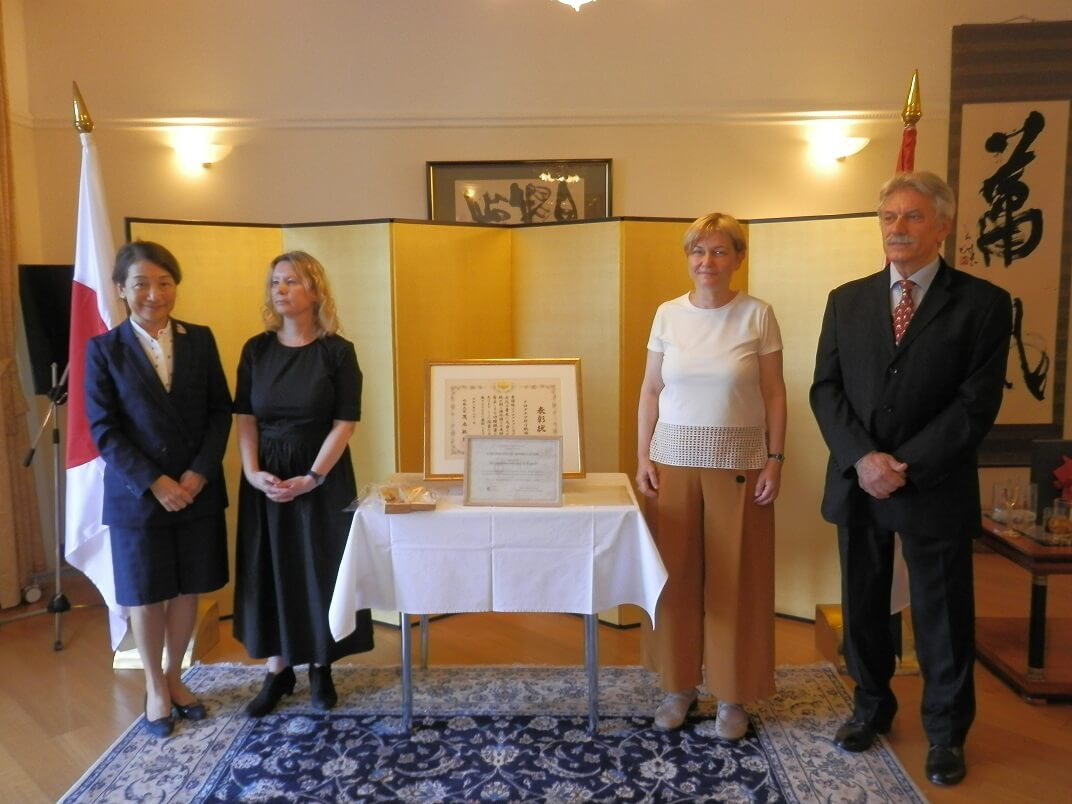
The handover ceremony of the Foreign Minister’s Commendation to the Croatian Origami Society, June 2021 © Japanese Embassy Croatia
She is also particularly delighted with Biograd na Moru, a Croatian city in the Zadar area that not only commemorates the Atom Bomb falling on Hiroshima and Nagasaki but also has a metal crane bird as a monument to this dreadful tragedy that occurred on August the 6th, 1945.
”There is a legend that cranes live for a thousand years, so they are often used as presents for somebody who has been met with disasters or illness. In Hiroshima, they have a thousand cranes (made in the origami technique) folded and presented for the wish of peace,” explained the Ambassador. Such a ceremony was also seen in Biograd na Moru, initiated by mayor Ivan Knez with a large metal crane made to outlast paper for generations to come.
The Japanese martial art of Karate is also popular in Croatia with some quite good successes achieved by Croatian athletes. Last month, the European Karate Championships were held in Poreč, where Ambassador Kaji was invited and was again fascinated with the use of the Japanese language and overall traditions despite there not having been a single Japanese athlete present there.
With so much of Japanese culture being present here in Croatia, it’s difficult to say what the most beloved aspect of Japanese culture is for the Croats.
Before the pandemic struck, Ambassador Kaji remembered the Japan Day event in Zagreb’s popular Mimara Museum, which saw huge attendance and a presentation on Japanese food, sake (Japanese rice schnapps) degustation, Ikebana (flower art), a tea ceremony, bonsai (aesthetical horticultural shaping of small trees), martial arts such as Karate, Judo, Kendo, haiku poetry workshops, calligraphy, Igo chess and much more.
2019 was also a big year for a Japanese promotion with the 2020 Olympic Games, which saw Croatian athletes from the 1964 Olympics attend the promotion for 2020. Additionally, for Japan, as Ambassador Kaji pointed out, the Paralympic Games are an important measure for the general success of the Olympics, which was evident in the ParaBOX installation (where visitors were challenged to find a ball in complete darkness), and the presentation of the Japanese car company Toyota’s car which is designed to be able to be driven by people with disabilities.
However, when it comes to younger people, particularly students of Japanology (which Croats can study at either Zagreb or Pula University), one cultural trend emerged.
”The Japanese language is very tricky to learn, so I asked one graduate student how she first encountered Japan and heard the language, and it was anime,” Ambassador Kaji recalled. She added that the Japanese cartoon art of anime became pretty universal and is no longer limited only to Japan. (The same goes for Japanese comics such as manga, with both of these pieces of pop culture being incredibly diverse in genres and having something for everyone, covering all social groups and even not avoiding vivid graphic images of violence and/or sex).
”At the Foreign Ministry of Japan, we have an award from a world competition because of the promotion of manga, but without trying to focus or push deliberate energy into that promotion,” stated Ambassador Kaji.
As Japanese pop culture, anime and manga are indeed very popular here in Croatia, which is visible at the Pandakon conference that is held annually at Zagreb’s Močvara club. Fans often dress up as their favourite characters, and there are often rewards for the best cosplay.
However, there are also heated debates between fans and people in the manga/anime industry that also affect Croats. On the one hand, representatives of the anime and manga industry are unhappy with cosplay, viewing it as a copyright infringement and believing that fans should be paying for cosplaying these characters. On the other hand, fans say they are just trying to show love and appreciation for their work, and they are also promoting and attract new audiences. It’s indeed true that someone might not know what is ”Deadman Wonderland”, but upon seeing a brilliantly crafted cosplay of Shiro, they may ask the cosplayer about the character and then watch anime or read manga.
Ambassador Kaji says the Japanese Government is aware of the problem.
”Earlier in January, the Minister for the “Cool Japan“ Strategy (with Cool Japan being a brand strategy, aiming to disseminate Japan’s attractiveness and as a unique culture throughout the world), Shinji Inoue said that he was aware of an opinion among the cosplay community rising, and this could be a real legal problem. It was important to secure an environment in which people can enjoy cosplay at ease, without worrying about possibly breaching laws. So, the Minister declared that he would come up with ways to deal with it but has not yet specified what those ways will be,” explained the Ambassador.
Friendly Nations: sharing values, but trade could be better…
The cosplay question is one of the political issues in Japan, but when it comes to politics, what exactly is going on between Croatia and Japan?
”We’re friendly countries; we share the same values. Unfortunately, you can’t speak your own mind in every country, but Croatia and Japan belong to those countries where you’re free to have as many children as you want, free to say what you like, free to travel where you want, free to choose your own vocation. In other words, we’re both free countries that share the same values, democracy, human rights, and rule of law,” said Ambassador Kaji, adding there are occasional disagreements, but that is normal and nothing to worry about.
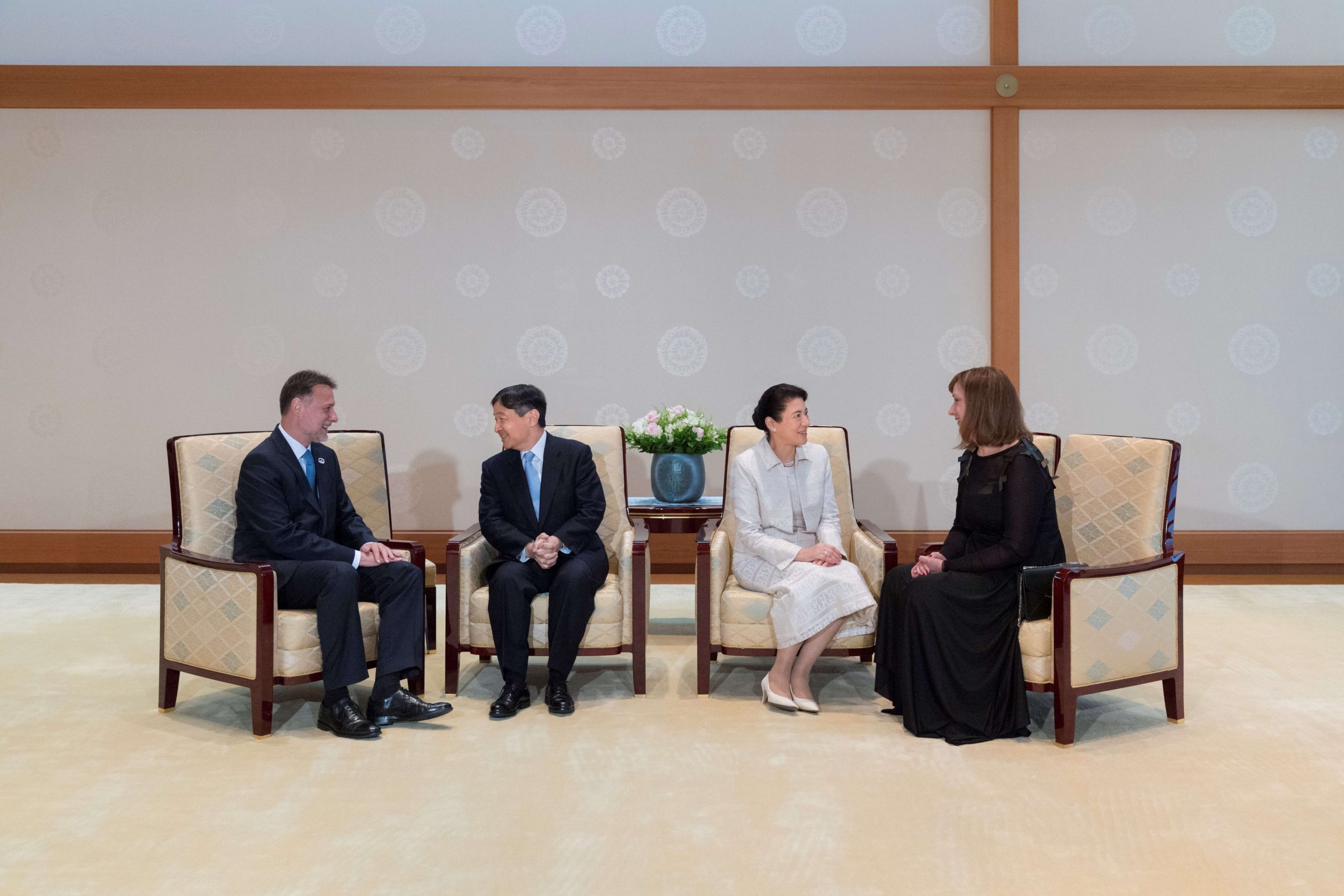
The Emperor and Empress of Japan grant an audience to the Speaker of the Croatian Parliament Gordan Jandroković and Mrs Jandroković during their visit to Japan upon the invitation of Speaker Oshima of the Japanese House of Representatives, June 2019 © The Imperial Household Agency
Kaji also pointed out that Croatia is pretty prevalent in Japan thanks to its sporting heroes. ”Everybody knows who Modrić and Čilić are; Croats are disproportionately present in world sport,” she said.
Ambassador Kaji also rates Croatian EU membership as a great advantage.
”Through the EU, you’re very well represented. When Croatia held the European Council Presidency during the first half of 2020, one of the most important parts of Croatian foreign policy concerned the Western Balkans and you advocated the EU’s perspective for them as we don’t want to roll back into a conflict or the changing of the borders after such a great sacrifice,” Ambassador Kaji stated, referring to the war back in the ’90s.
An important instance of that is the Zagreb Declaration from June the 22nd, 2020.
”We’re part of the group that supports the European idea, and through that, the Croatian idea, as we share the same values,” confirmed the Ambassador.
She added that while it may seem far away, the issues of the Balkans are relevant to such ideas like the Free and Open Indo-Pacific, and advocating the peace and freedom of nagivation, for example, is required on both locations, and Japan sees Croatia as a partner in that regard.
Ambassador Kaji also regularly contacts the Croatian Ministry of Foreign and European Affairs (MVEP), the Government, Parliament, the President’s office, various cultural institutions, sports institutions such as the Croatian Judo Federation, the Croatian Karate Union, and the Croatian Olympic and Paralympic Committees, educational institutions, local government units and more. She also works on maintaining friendly ties with other ambassadors and diplomats in Croatia.
”My diplomatic colleagues know that only those who are blessed get to be stationed in Croatia,” revealed Ambassador Kaji, not hiding her happiness for representing Japan in this Southeastern European country.
She is also particularly excited about going to Virovitica this week since she has never been. The visit is to attend the exhibition on Japanese pottery titled ”Yakishime: Earth Metamorphosis” which is coming to Virovitica after already having been held in Vukovar and Pula.
Commenting on the most frequent contact she keeps in Croatia, she said that it’s very hard to say, but statistically, maybe the Japanese Embassy communicates the most with MVEP. ”We’re only two minutes away from the Ministry,” said Ambassador Kaji.
Of course, not everything can be equally balanced and trade is unfortunately currently sitting on pretty low branches of the overall tree.
”When it comes to trade, we made up only 0.28% of Croatia’s exports with tuna being a major portion – which is nice. In addition, when it comes to investments in Croatia, only 0.5% of all investments come from Japan. So there’s room for improvement there,” stated Ambassador Kaji with optimism.
Some of the instances of trading and business between the two countries can be seen in the Japan-based company Nipro taking over Piramida, a Croatian pharmaceutical packaging producer from Sesvete near the City of Zagreb last month.

A visit to Nipro PharmaPackaging Croatia, June 2021 © Japanese Embassy Croatia
Knowledge – the way forward while not forgetting culture or tradition
As mentioned, Japanese culture is widely popular and much loved among Croats, the Japanese love Croatian athletes, and the two countries share friendly relations. Both Croatia and Japan have their traditions and cultural heritage. With ever-present technological development, some people in Croatia do fear that progress will lead to Croats forgetting their traditions, ways, and cultural heritage. On the other hand, Japan has seen huge technological development evident in very fast internet, modern trains, robotics, and more. Yet, their tradition and culture remain well preserved. What’s the secret, and how can technological advancement be balanced with keeping a focus on tradition?
As Ambassador Kaji explained, the gist is to ”keep your spirit, but introduce technology”. While the Ambassador believes that the path of economic development makes sense in the long term, it wasn’t always so easy. In the past, economic development was accompanied by pollution, and Japanese people, apart from developing health issues, entered an atmosphere that wasn’t very kind to their traditional ways. But things have improved since then.
”In the 21st century, people and governments are more focused on green technologies and digital technologies which can be friendly towards and resonate with keeping up with traditions. Like when drinking tea, you have a ceremony, but the leaves for the green tea need to be carefully nourished in a kind environment, so that isn’t very compatible with mass production or polluted air. But when, for example, you use the wind to produce energy, that’s a nice eco-friendly way that co-exists with traditional culture,” explained Ambassador Kaji.
She added that this way of co-existing then becomes mutually supportive and crafted to be resilient and long-lasting. That being said, new technologies also need to be carefully crafted to keep an eye on traditions, and improvisation is troubling in that regard.
”If you show respect for tradition, and you use academic knowledge or research, then there must be a way of remaining aligned with tradition and pursuing technology to have them both be mutually supportive,” concluded Ambassador Kaji, and her belief about Croatia’s technological development is that it will not be fatal to Croatian tradition.
Speaking of tradition, traditions form habits that then become accepted in various societies. With the already mentioned Japanese love for punctuality and the general perception of the Japanese as organised people that like order and plans, the perception of Croats can be quite the opposite. Many see Croats as laid back and relaxed, not making a fuss if they are a bit late. However, Ambassador Kaji sees a different picture of the Croats from her experience, particularly when it comes to Croatian women.
”A cleaning lady from Slavonia that comes to clean my office every day just starts working and cleans meticulously. She doesn’t leave one small thing out and she is very responsible. In Japan, you don’t see so many women gardening, and here, the women that watch over my garden are very powerful and professional, and that is very impressive,” she noted. The work ethic and responsibility are something she sees with all of the Croats working for her.
”When it comes to Japan, we plan for perfection, so the dark side of that characteristics is, for instance, being late with the vaccination rollout. There are all sorts of verifications that take place there, making sure everyone can get them, and yes, they’re proven safe abroad, but we had our own evaluations done, and that was the main reason we’ve been criticised for being too slow. Here in Croatia, you’re really good at improvising. We can learn from each other,” Ambassador Kaji said, sharing her observations on the habits of Croats and people in Japan.
She added that one such thing where Croatia can learn from Japan is crisis response, particularly when it comes to earthquakes.
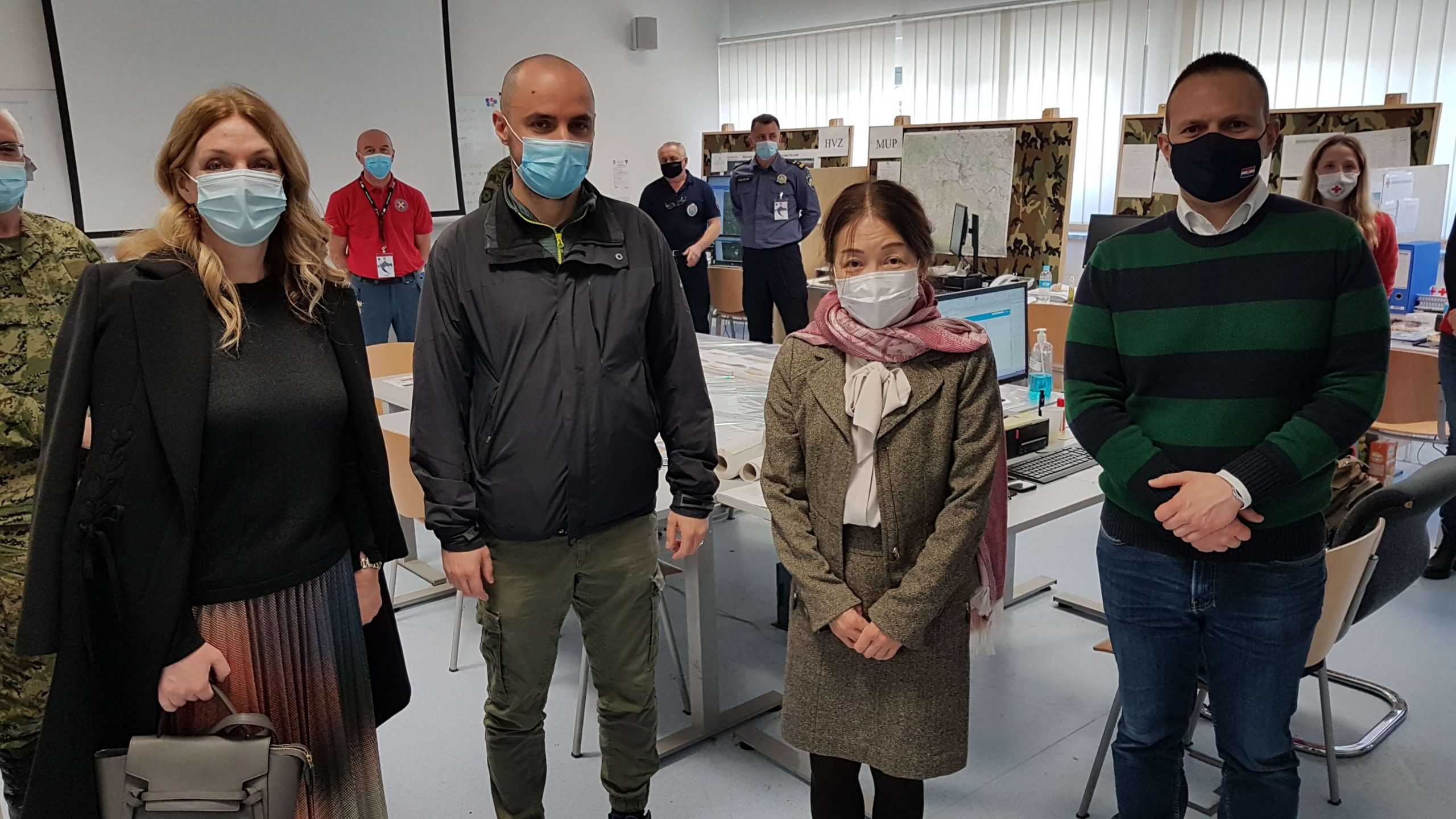
At the Civil Protection Headquarters for Dealing with the Aftermath of the Petrinja earthquake in December 2020, March 2021 © Japanese Embassy Croatia
Post-earthquake reconstruction by Japanese experts: Zagreb’s buildings can keep their looks and also become safer
Japan is famous (or as Ambassador Kaji rated with a humorous touch, perhaps notorious) for regularly having earthquakes. Tsunamis happen as well. This was even noticed by reporters from the Croatian paper Jutarnji List, who, when following the earthquakes in Zagreb and Petrinja, interviewed Ambassador Kaji in search of advice on living with earthquakes. An equipped backpack with water, food, batteries, and lights ready for evacuation, along with agreeing on a location at which were to meet with your loved ones, are some great bits of advice for planning once you accept that earthquakes can happen at any time, anywhere.
”You can’t stop earthquakes, but if you’re prepared, you can mitigate the damage they cause and protect lives. People often think earthquakes happen, and that’s that, but earthquakes are never over,” said the Ambassador when recalling that interview.
”I was at my residence when the Zagreb earthquake happened more than one year ago, and the epicentre was just three kilometres away. It was pretty bad but not serious with only small cracks on the wall,” recalled Ambassador Kaji, not seeming to feel unsafe in a Japanese earthquake-conscious building, while Croatia isn’t always so aware that the Earth’s plates can move and cause total chaos.
The earthquake that gave Zagreb such a heavy blow in March 2020 is a normal monthly, if not weekly, occurrence in Japan. The country’s ultra-modern buildings and skyscrapers were built to sustain such rumbling, but even the traditional signature Japanese style of architecture (such as the signature Pagoda of Horyuji, the oldest wooden high-rise Japanese building built in 680A.D.) sustained numerous earthquakes over centuries, as Japanese builders always had to try to cope with earthquakes. But, with Zagreb being proud of its architecture, particularly in the downtown area, can the Croatian capital possibly preserve its signature look but also become safer for its residents if such magnitudes or higher strike once again?
”I asked some Japanese experts about whether or not it would be possible to preserve the nice, historic architecture of Zagreb and not just totally transform it into a modern but very common city, and they said it was possible. That needs investment, but there are ways to somewhat reinforce the basic structures and preserve their looks,” assured Ambassador Kaji. She also added that the speed and focus of reconstruction is something Croatia can learn how to be better at from Japan.
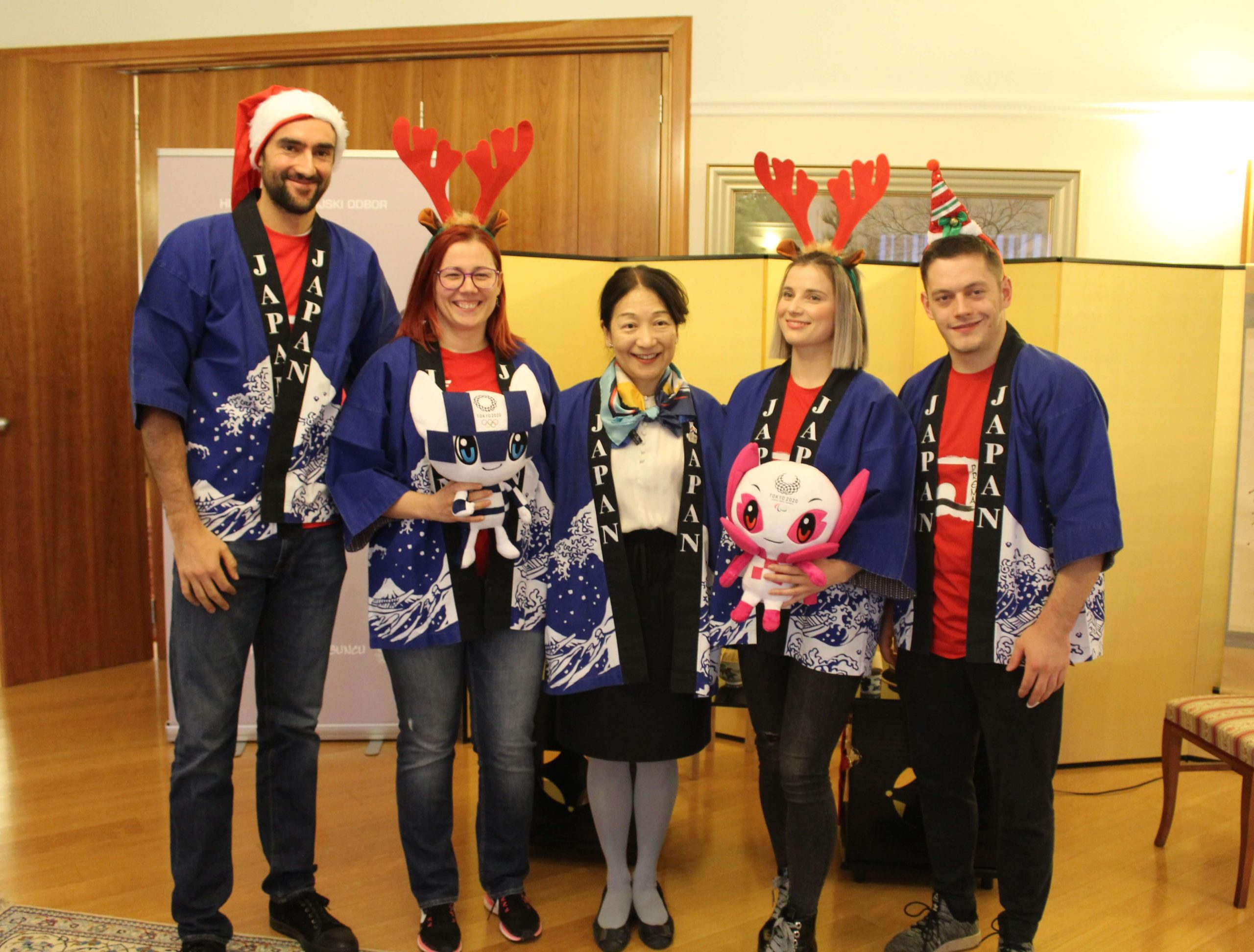
Towards the Tokyo 2020 Olympic and Paralympic Games, December 2019 © Japanese Embassy Croatia
The Adriatic is nice, but UNESCO heritage really excites Japanese people
With data acquired before coronavirus, Ambassador Kaji stated that there were 150 Japanese nationals living in Croatia, and 150,000 Japanese tourists visited the country. What several people noticed was that while many foreigners come to Croatia primarily to enjoy the coast and swim in the Croatian Adriatic, Japanese tourists can rarely be seen on the beach and prefer sightseeing.
”Japan is surrounded by the sea, so the sea isn’t something amazing to them, but Japanese people are very interested in cultural heritage, and when something is recognised by UNESCO, people in Japan really rejoice. So, the Japanese are very much interested in historical or artistic values Croatia offers,” explained Ambassador Kaji, clarifying why so many Japanese tourists can often be seen as frequently in continental Croatian towns and cities and not just on the coast.
Despite some Croats sometimes being a bit xenophobic or looking differently at people of other races, Ambassador Kaji was surprised when asked about whether there were any racial issues that Japanese people experienced and reported in Croatia.
”I don’t know if things were different before regarding racial issues, but the story I heard when I came to Croatia was that back in 2011, many Croats gathered in front of the Embassy of Japan with flowers, candles, and cranes to express their grief and support regarding the Fukushima Tsunami and the earthquake,” said Ambassador Kaji.
Just like those who came with flowers, the Embassy is equal and open, too. The Embassy issues scholarships for people wanting to study in Japan twice a year, and apart from being open to anyone that wants to travel to Japan and get informed about the country and visa requirements, the Embassy also has a library people are welcome to come to and read through Japanese books and literature.
Apart from being in regular contact with other colleagues based in Croatia, Ambassador Kaji also regularly contacts the Croatian Ambassador in Japan, Drazen Hrastic.
”Before I left Tokyo, we had dinner together, and now we talk often, as well,” said Ambassador Kaji with a smile.
With Japanese culture being so appreciated in Croatia, and Croatian sporting heroes and UNESCO heritage being so beloved in Japan, spiced with common political values and friendly diplomatic relations, Croatia and Japan truly have the chance to learn from each other and continue to work on the further nurturing of their diplomatic ties, and their shared trade.
If you’re a Japanese citizen or a Croatian citizen in need of information, here is how you can reach a Japanese diplomatic mission in Croatia:
In Zagreb:
Japanese Embassy
Adress: Boškovićeva 2
Mail:
Consular Section: [email protected]
Political Section: [email protected]
Economic Section: [email protected]
Section of Culture / Public Relations: [email protected]
Phone number: +385 1 48 70 650
In Split:
Consulate Office
Adress: Marasovićeva 67
Mail: [email protected]
Phone number: +385 21 32 35 80
And of course, you can find all the latest news concerning Japanese-Croatian relations on the official website.
To read more from the series “Friends of Croatia”, follow TCN’s dedicated page.
For more about Japan – Croatia relations, follow TCN’s dedicated page.

